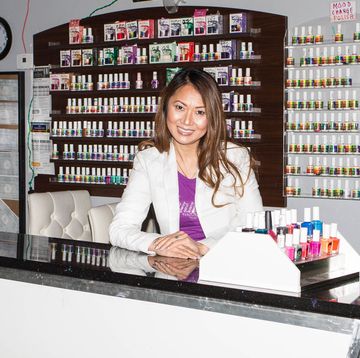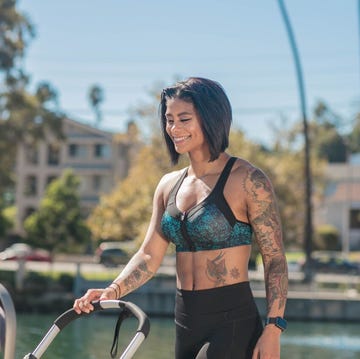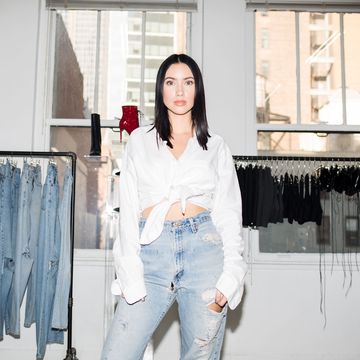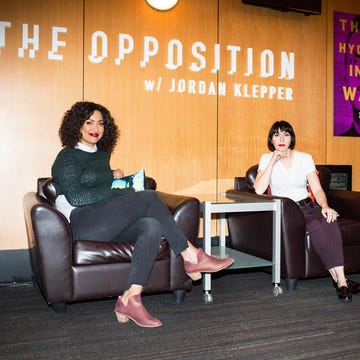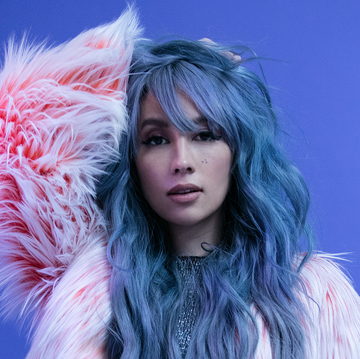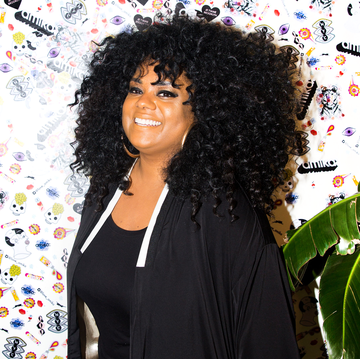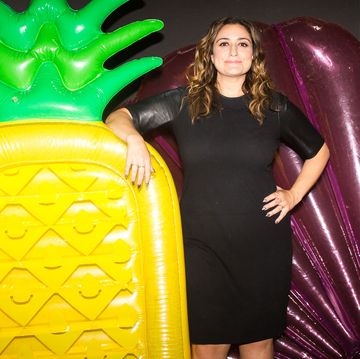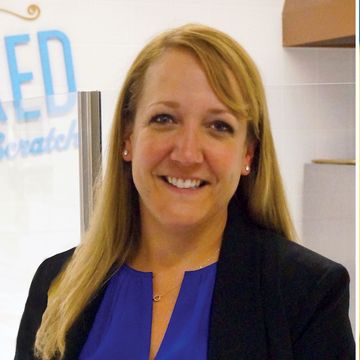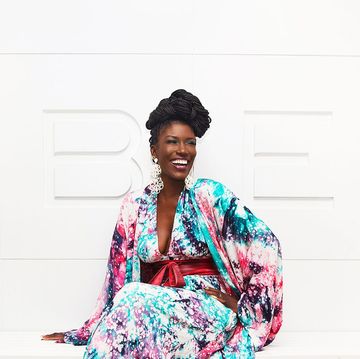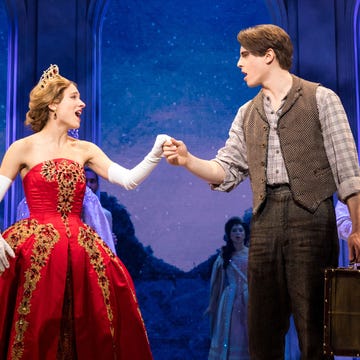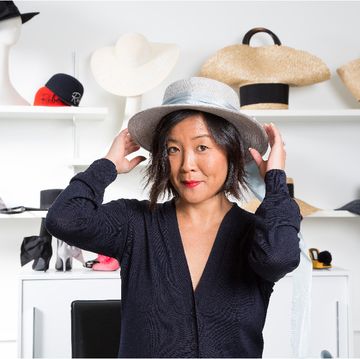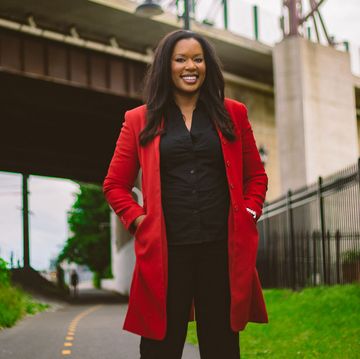Jessica Knoll came to New York City to be a writer but didn't have any real plan on how to achieve that. After several assistant jobs and dead-end internships, she found herself unemployed and on the verge of having to pack up and abandon her dreams. Then she landed one more assistant job, this time at Cosmopolitan magazine.
At the peak of her magazine career, Knoll quit to become a novelist. But this time, she had a plan. Knoll's debut novel, Luckiest Girl Alive, was released in May and has been on The New York Times best seller list for seven weeks. Reese Witherspoon is producing a film adaptation, and Knoll is writing the screenplay. Knoll, 31, talks about the deliberate moves she's made in her life and her career to get her to where she is today.
For as long as I can remember, I wanted to be a writer. I felt really passionate about it and knew I could tell a good story, but I didn't know anyone who was a professional writer as an adult.
One of my professors at Hobart and William Smith Colleges taught a screenwriting class that everyone was dying to get into. This was the first time I thought, Oh, maybe I could be a screenwriter. This professor's daughter was an actress, and she was represented by a talent and literary agency called Paradigm Agency. He hooked me up with an internship there — in L.A. — the summer between my junior and senior years.
I came back, and I had it in my head all year that I was going to be a screenwriter, even though I didn't really understand what that entailed. In this internship, I did a lot of script coverage, which means you basically do a book report on every script because the agents don't have time to read everything that comes in the mail.
When I graduated, this professor said to me, "If you can get a job at this agency, you'll understand the business side of things and it will help you get your foot in the door in this industry." I ended up getting an assistant job at Paradigm in the New York office. I owe my entire adult life to it because I met my husband there, I met my best friend there, and I met my lit agent there.
I worked there for about eight months, and it was really clear to me that there wasn't a real trajectory for me there because I didn't want to be an agent. However, it got me to New York City. I started reading Gawker, and I discovered Mediabistro and all these resources I had never heard of going to a small liberal arts school in upstate New York. That's when I thought, Why don't I just get into editorial at a magazine? I read every magazine growing up. When I was 12 years old, I was reading Jane and Cosmo and Glamour.
I stumbled across a listing about a paid internship at Parenting magazine. It paid $10 an hour. I made a deal with my parents that they would pay for 35 percent of my rent if I could cover the rest of it. And it would be temporary. The internship only lasted three months.
I quit the job at Paradigm. I lived in a shoebox, and my rent was still more than I could afford. I would never just buy a monthly MetroCard because I couldn't spend 70-some dollars at once. Lots of nights, I would walk home two miles to the Upper East Side just to spare myself the subway fare. There was a sense of: Is it always going to be like this?
The internship ended right around the time I went on two interviews for editorial assistant jobs — one at Brides and one at Lucky. I didn't get either of them and it was devastating. There was a very scary period of three weeks where I didn't have income and my parents had to really float me.
Then I ended up getting a temporary editorial assistant job at Popular Science. It was really like an admin job, but it bought me some time while I continued to chase down any job lead I possibly could.
The guy I was dating at the time — who is now my husband — said, "One of my best friends grew up with this girl who is an editor at Cosmo. Do you want me to put you in touch? I said, "Absolutely." It just so happened that they were hiring an editorial assistant.
At that point, I was a month shy of turning 24. I was still so young, but I was interviewing with girls who were straight out of college. During an interview, I remember [former Cosmopolitan brand director] John Searles saying, "You've been an assistant for two years now. Do you really want to be an assistant again?" And I was trying not to cry, I wanted the job so bad.
I probably did more writing when I was an editorial assistant than I did in any other position I held over the years in magazines. I did all this admin stuff during the day so the only time I could write and pitch was at night. I had, like, nine bylines in every issue. I would work till 9 or 10 at night most nights. I was in that role for about a year and a half, then an associate editor moved up, so there was an opening.
I had to go into the editor-in-chief's office, who was Kate White at the time, and ask to be considered for the role. They put me on this trial period for a couple of months. It felt like waiting for the guy you have such a crush on to call. They gave me longer pieces and tighter deadlines, and I just had to do it all. Eventually, they told me they were going to promote me.
In another year and a half, there was an opening for a senior editor, and I didn't have to do that whole dog-and-pony show again. I had earned that privilege.
About four years in, Kate White left and Joanna Coles came in. That was another trial by fire. She made it very clear that she had a new vision for Cosmo and she wanted to make sure the staff beneath her was on board for these changes. One thing she said was, "I love when people barge into my office and say, 'I have the best idea!'" She wanted people out there living their lives, going to events, and coming up with story ideas based on what people were actually talking about — not just poaching some idea from a post on Jezebel.
I did all those things, and I made sure to stop her in the hallway at least once or twice a week. A couple weeks into her tenure at Cosmo, Joanna made a lot of changes to the staff. There were two editors that weren't let go, and I was one of them. I was told later it was because I did all those things she said she expected from the staff.
I can really trace back my motivation to write a book to that moment. It was the first time in a long time that my [job] security had been threatened. I had been at Cosmo going on five years. I was kind of teacher's pet. I got along really well with everyone. I knew they valued my work. And then Joanna came in, and it was like, Wow, this isn't forever. It took me back to that period in my early 20s when things were so insecure and I was like, I never want to feel like that again.
A friend I met at Paradigm was a literary agent at this point. She would email me periodically asking, "I know you have a book in you. Are you writing?" After I survived at Cosmo, I sent her an email that said, "I want to write a book. It seems really overwhelming and daunting. I'm used to tight deadlines. Can we work out a system where I send you a few chapters every six weeks?" We worked like that for nine months.
In the magazine world, you don't have to be to work until 9:30 or 10. I had hours in the morning, so I used that time to write. On the weekends, I'd write for a few hours, then go out with friends or spend time with my husband. I felt like I was creatively, professionally, and personally fulfilled. And I just had this feeling like something is really going to come of this.
When I was an associate editor [at Cosmo], I found out that Hearst would pay for any class that you took that was directly related to your job title. So I submitted this form to see if they would cover this short-story writing class at NYU and they covered the whole thing. It was like being in a writers' group. Nine people and the professor. We met once a week and we workshopped each others' stories. One of the short stories I wrote was from the perspective of a girl who went to my college who [was accused of raping] a guy. She was also this popular, pretty blonde girl at this ritzy liberal arts college. There was this mix of the dark and the glam, the ugly and the pretty. I was fascinated by the way that she had brushed it off like nothing had happened. I couldn't understand how a person could do that.
I thought there was something to writing in the voice of a polarizing character. I was also really interested in crime. There was one crime in particular [that had been in the news] that really fascinated me. So I found a way to weave this crime in with the voice of a character I had created in that short story, and that was how Luckiest Girl Alive began. Every night, I would go to bed and be up for hours trying to put all the pieces together in my head.
I wrote half the book while I was still at Cosmo, then I got a job offer at Self to be the articles editor, where I finished the book. When it was done, my agent sent it out to publishers on a Friday and I had a preemptive offer from Simon & Schuster by Monday. The preemptive offer sounded like quite an impressive number to me. But my agent was like, "We can do better. I'm going to tell them no and see if they can come back with something better." In that time period, I got two more offers and it turned into a bidding war.
I didn't tell a lot of people about the book deal because you hear this number and you get in your head, Oh, I'm quitting my job and moving to the islands and I'm going to be a writer for the rest of my life. But it's paid in four installments and taxes take a lot. I was brought back down to reality once I realized how it all technically shakes out.
I had a good thing going at Self. We were re-conceptualizing the magazine, and it was fun. And I had already written the book. I didn't think there was any reason for me to quit my job. Then when we were getting ready to send out advance copies of the book to the media, I started having this anxiety. I was worried I would limit the coverage I could get if I was affiliated with one brand.
I quit my job in November 2014 about six months before the book came out. I wrote 80 personal notes to every single editor we sent the book to. I gave them my work history, told them I also worked in magazines — it was a "we're cut from the same cloth; help a sister out" type of thing. We sent them out with champagne or macarons — any special touch to make it stand out.
My best friend, who I met at Paradigm, and who had become an agent at CAA, felt I should get a second agent for film rights. I agreed, and she got the book to Reese Witherspoon. Everyone knew Reese started her production company, Pacific Standard, because she felt like there was this dearth of complicated roles for women. She wanted to develop projects where the girl wasn't just the girlfriend or the sidekick or the plucky heroine. At this time, Gone Girl was coming out, and Wild was about to come out. And when she got my book, she loved it.
My first call with Reese and Bruna [Papandrea, Witherspoon's producing partner], I was still at Self. I closed my office door, and I was so nervous. I did the superwoman stance. It's where you stand with your hands straight over your head and your feet wide, and it sends a signal to your brain to give you a confidence boost. My doors at Self were frosted so you could still kind of see my silhouette. My assistant probably thought I was crazy.
During the call, there was a lot to take in. I wanted them to say, "Step one is this, step two is this, step three is this," and it doesn't work like that. Every project is a case-by-case basis. But we decided that the three of us were a package deal. I couldn't accept any financial deal unless they were on board as the producers. To me, we were on the same page from day one in terms of our vision.
They told me later when they sent the manuscript out to a bunch of studios that all the women creative execs who read it — and in Hollywood, all the female creative execs are 29 to 32, right in that sweet spot of [the audience for] the book — went crazy for it. They took it to their male bosses and were like, "We have to have this!" That's how I ended up with a deal at a big studio like Lionsgate. These women saw themselves in my story and were like, I get what she's going through. I get that you feel there are certain markers you have to hit at certain ages as a woman, and if you don't, you feel like there's something wrong with you.
Bruna and Reese were also always very supportive about me writing the script and they thought the best way to do it would be with a co-writer. I thought, That's fine. I've never written a script before. Then there was talk of another more established screenwriter doing it. And it didn't work out. In the 11th hour, my agent was like, "Just as a reminder, Jessica is really interested in writing the script." Everyone realized it would be a real time suck to interview all these co-writers. So I've been working on the screenplay and I feel really good about it. I'm in the groove again.
With all of this happening, I lived in La La Land for a while. I wrote a book. Simon & Schuster is positioning it as their big book of the summer. I got a movie deal. Reese Witherspoon is attached to it. I thought, Of course it's going to come out and it will do well. I don't think I realized that all of that is still not enough to make a book successful. You have to hustle so hard to get it out there.
The biggest lesson I've learned is you cannot leave anything up to fate. People ask me, "How did you write a book that landed on The New York Times best seller list?" It's not even about the book. It's that I positioned myself for success before I wrote the book. I got in with the right people. I got experience under my belt. I watched and paid attention to what books were successful and which ones weren't. I asked for help and asked for advice. It's not enough to just follow your dreams. There's a lot you have to do to make them happen.
Get That Life is a weekly series that reveals how successful, talented, creative women got to where they are now. Check back each Monday for the latest interview.
Follow Heather on Twitter.


